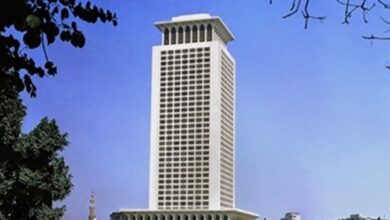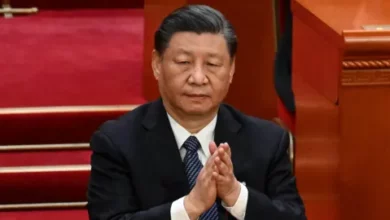Six presidential hopefuls issued a joint statement on Wednesday, outlining their priorities for the transitional period, although two of their number, Amr Moussa and Abou Ismail, expressed reservations on the timeline for the transfer to civilian rule specified in the statement.
The timeline announced in the statement said the parliamentary elections should start on 28 November, as scheduled by the military council, ending on 23 December, and be followed five days later by the Shura Council elections, running between 5 and 30 January.
The timetable specifies 5 January for presidential hopefuls to start registration, 1 April for the presidential elections, 15 April for runoffs, and 20 April for the hand-over of power to the elected president.
The other four signatories to the statement were Islamic thinker Mohamed Salim al-Awa, former MP Hamdin Sabbahi, former Muslim Brotherhood leader Abdel Moneim Abouel Fotouh, Salfi preacher Hazem Salah Abou Ismail, the former vice president of the Appeals Court Hisham al-Bastawisi.
According to the Constitutional Declaration issued by the Supreme Council of the Armed Forces (SCAF) on 25 September, the parliamentary elections are due to be held between 28 November and 10 January, and the Shura Council elections between 29 January and 11 March, leaving 10 days between each of the three rounds. The two parliamentary houses are then to meet at the end of March to choose a 100-member constituent assembly to draft the new constitution.
Following this declaration of the new constitution, Egypt's presidential elections are expected to be held at the end of 2012 or the start of 2013.
Presidential hopefuls believe that the new parliament should draft the new constitution within a period of not less than six months, followed by a public referendum to approve it. They believe there are certain dangers inherent in any prolonging of the transitional period.
"I believe that implementing what we have said is the best solution to overcome the political fluidity, the state of security chaos and the economic crisis," said Awa.
Abou Ismail, meanwhile, proposed a shorter timeline that includes holding parliamentary elections between 5 November and 3 December, and the Shura Council elections between 12 December and 4 January.
According to Abou Ismail's vision, the start of registration for presidential elections should be on 19 January, followed by the election of a new president in February and the military handing over power.
"We have all announced our position, and starting from today there will be no communication between us and the military council until the demands are met," said Abou Ismail.
"Even if some people imagined that we are doing this out of personal interest, it is not important for us. It is much more important to push the military council away from power as soon as possible," he added.
Observers believe the Abou Ismail is the toughest critic of the military council among the six men, and is known for his highly-critical tone of the military junta's policies.
The statement noted that Moussa objects to the timeline. He left the hall before the press conference started and left a representative behind, indicating his lack of confidence in the timeline.
Nabil Abdel Fattah, an expert at the Al-Ahram Center for Political and Strategic Studies, said this lack of unity among the six men is the result of some candidates' attempts to raise their profile by appearing more highly critical of the military, while the truth is that none of them really wants to clash directly with the SCAF, which is seen as an essential ally in the political arena.
Most of those who signed the statement are new to politics, except for Abouel Fotouh, who was a former Muslim Brotherhood leader and member of parliament.
The first meeting of the presidential hopefuls took place in the middle of August, when they announced their rejection to the Emergency Law and the military trials of civilians, and called for activating the Treachery Law against former NDP members, while amending the law regulating parliamentary and Shura Council elections.
The statement issued yesterday said that ignoring these key demands would represent a step towards major political crisis for Egypt.
The presidential hopeful Mohamed ElBaradei withdrew from the meetings without giving clear reasons, but some press reports said he had called for drafting a new constitution before holding elections, an idea that was rejected by the rest of the candidates.
The presidential race includes several other names, most prominent of whom are Ayman Nour, an opposition figure under Mubarak's regime, who ran in the presidential elections in 2005, and Magdy Hatata, former Chief of Staff of the Egyptian armed forces in the 1990's.
Field Marshal Hussein Tantawi, head of the Supreme Council of Armed Forces, recently denied the accusation that the armed forces intend to nominate a military figure for the post of president.
However, observers said the remarkable activity of Tantawi during the past few days, including visits to some economic facilities and a walkaobut in civilian clothes in downtown Cairo, indicates that the military will indeed provide a candidate in the upcoming elections.




